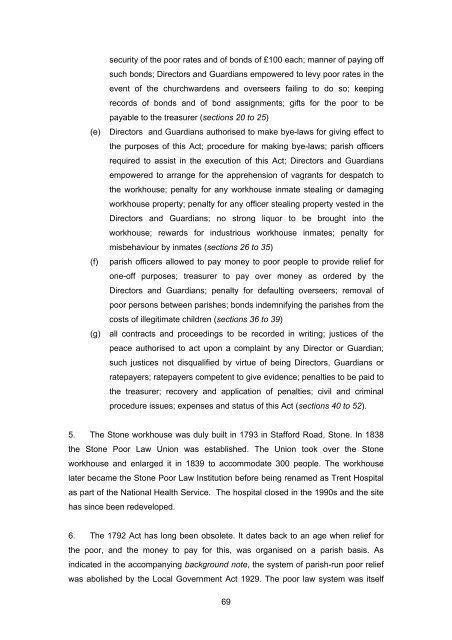Poor Relief - Law Commission
Poor Relief - Law Commission
Poor Relief - Law Commission
You also want an ePaper? Increase the reach of your titles
YUMPU automatically turns print PDFs into web optimized ePapers that Google loves.
security of the poor rates and of bonds of £100 each; manner of paying off<br />
such bonds; Directors and Guardians empowered to levy poor rates in the<br />
event of the churchwardens and overseers failing to do so; keeping<br />
records of bonds and of bond assignments; gifts for the poor to be<br />
payable to the treasurer (sections 20 to 25)<br />
(e) Directors and Guardians authorised to make bye-laws for giving effect to<br />
the purposes of this Act; procedure for making bye-laws; parish officers<br />
required to assist in the execution of this Act; Directors and Guardians<br />
empowered to arrange for the apprehension of vagrants for despatch to<br />
the workhouse; penalty for any workhouse inmate stealing or damaging<br />
workhouse property; penalty for any officer stealing property vested in the<br />
Directors and Guardians; no strong liquor to be brought into the<br />
workhouse; rewards for industrious workhouse inmates; penalty for<br />
misbehaviour by inmates (sections 26 to 35)<br />
(f) parish officers allowed to pay money to poor people to provide relief for<br />
one-off purposes; treasurer to pay over money as ordered by the<br />
Directors and Guardians; penalty for defaulting overseers; removal of<br />
poor persons between parishes; bonds indemnifying the parishes from the<br />
costs of illegitimate children (sections 36 to 39)<br />
(g) all contracts and proceedings to be recorded in writing; justices of the<br />
peace authorised to act upon a complaint by any Director or Guardian;<br />
such justices not disqualified by virtue of being Directors, Guardians or<br />
ratepayers; ratepayers competent to give evidence; penalties to be paid to<br />
the treasurer; recovery and application of penalties; civil and criminal<br />
procedure issues; expenses and status of this Act (sections 40 to 52).<br />
5. The Stone workhouse was duly built in 1793 in Stafford Road, Stone. In 1838<br />
the Stone <strong>Poor</strong> <strong>Law</strong> Union was established. The Union took over the Stone<br />
workhouse and enlarged it in 1839 to accommodate 300 people. The workhouse<br />
later became the Stone <strong>Poor</strong> <strong>Law</strong> Institution before being renamed as Trent Hospital<br />
as part of the National Health Service. The hospital closed in the 1990s and the site<br />
has since been redeveloped.<br />
6. The 1792 Act has long been obsolete. It dates back to an age when relief for<br />
the poor, and the money to pay for this, was organised on a parish basis. As<br />
indicated in the accompanying background note, the system of parish-run poor relief<br />
was abolished by the Local Government Act 1929. The poor law system was itself<br />
69
















